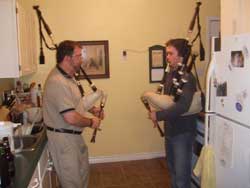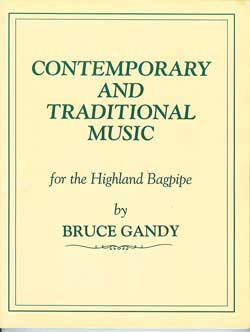Bruce Gandy
(1962 - )
 Bruce Gandy is one of the most natural and talented musicians, composers and competitors to enter the world piping scene in the last 50 years. As a player, he is “a piper’s piper” – a player whose gift for technique, rhythm, melody and poise even the best look up to.
Bruce Gandy is one of the most natural and talented musicians, composers and competitors to enter the world piping scene in the last 50 years. As a player, he is “a piper’s piper” – a player whose gift for technique, rhythm, melody and poise even the best look up to.
When in top form on the competition platform he is formidable, and while the major Scottish prizes seemed to elude him for a long time, in recent years he has begun to gather them up, much to the satisfaction of his friends and competitors.
As a composer, his catalogue of superb tunes and collections of bagpipe music are large and still growing. Pipers are often surprised to learn that a tune they’ve heard for years and thought was in the traditional repertoire is actually a Bruce Gandy composition.
In short, he is one of Canada’s national piping treasures.
Below, Bruce tells the story of his own life so far:
I was born on August 10, 1962 in Victoria, British Columbia. I began to play the pipes in December of 1970 in Victoria, British Columbia. My first teacher was Hal Senyk, who took me through the first exercises and tunes. Hal moved to Scotland to play with the famous Muirhead and Sons Pipe Band and study under Robert G. Hardie for a period of just over a year. It was at this time that I began a long and wonderful relationship with James Troy. During the 10 plus years that I spent with James Troy, I was given a foundation of playing that would benefit an entire solo and band piping career.
I remember going over to Jamie’s House for dinner on a Tuesday night. I had started going to dinner so that I might get home earlier as my lessons seemed to be going on from 7 until after 10 p.m., which was getting late for a 12- or 13-year-old. I think this starting earlier worked for about 3 weeks, but soon I was getting home around 10:30 and even 11:00. We used to have so much fun (most of the time) that I didn’t even worry about the time until the next morning. It was not at all uncommon to have a lesson for 3 or 4 hours, it was great.
Also during this time, I spent many summers down in Couer D’ Alene, Idaho at the piping school studying under Bob Hardie and Andrew Wright. These summers, combined with regular instruction, helped to instill a lifelong love and understanding of Piobaireachd.
In 1982, I moved to Ontario to join the 78th Fraser Highlanders Pipe Band, and this was where I began to mature as a player. Playing in a band that was at the forefront of innovation was tremendous, and there was a great need for new music for the band to play. This inspired me very much and I began to be called upon to compose very particular elements of a medley. “He has a gift for writing what we need, at any particular time for the band whether it be a medley tune or a jig or a piece in a certain rhythm, he always came back next Sunday with our answer,” recalls Bill Livingstone.

I spent 15 wonderful years with the 78th, traveling to Scotland each year as well as a variety of venues to perform concerts. These concerts were very taxing both physically and mentally but the rewards always far outweighed the pain. Playing Live in Ireland before a packed house of 900 may possibly be the highlight of my piping career. A World Pipe Band Championship, three live recordings, 13 North American championships and many life-long friends – who could ask for anything more from their pipe band.
In 1997 I moved to Summerside, Prince Edward Island to take over as Piping Instructor at the College of Piping and Celtic Performing Arts. I worked there for three years, setting up individualized study programs where again I met some truly wonderful people, as well as teaching the students from the local area on a weekly basis. Part of the job was being Pipe Major of the College of Piping Pipe Band, which meant teaching all of the fundamentals of pipe band playing as well as choosing and arranging all of the music for the band. This led to more composing to try to give a lower grade band a fresh edge, which eventually led to my 3rd book of music being published. Having not played in a lower grade band as a youth, I feel that this was a great learning experience for me.

In 1998, after an eight-year absence from the Northern Meeting at Inverness, I returned to the world’s top competition and won the Competing Pipers Silver Medal, along with 2nd in the jig and hornpipe and 3rd in the Strathspey and Reel. I returned for the Gold Medal in 1999 and was fortunate enough to win both the March and Strathspey and Reel but got no prize in the Medal. Fortunately, the medals did come, however. I won the Inverness Gold Medal in 2003 and I was able to capture the Oban Gold Medal the following year. Following that, I also captured the Bratach Gorm (Blue Banner) at the London Contest, and I have been very honoured to compete in the Glenfiddich Championship.
What I’ve taken away from these experiences, apart from the honour of the prizes, is the joy of playing with great pipers, and having such a fellowship of friends from many parts of the world, who all pursue this music with such passion, dedication and skill.

1 Comment